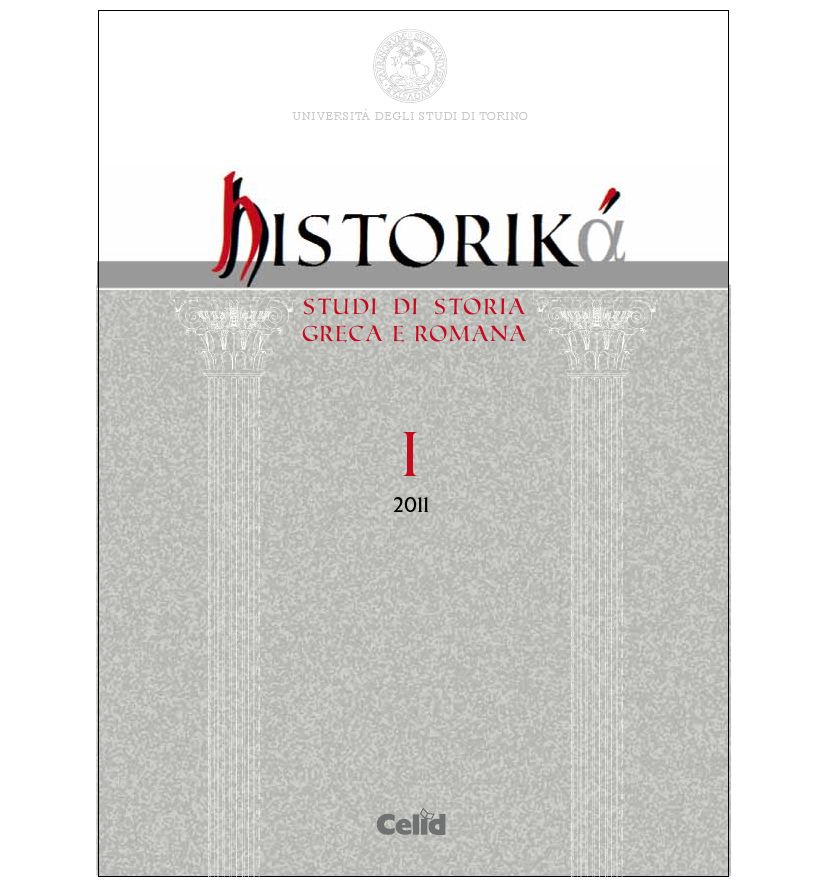Why did Xenophon write a Symposium? Erotika Paideia and Logos Sokratikos
DOI:
https://doi.org/10.13135/2039-4985/86Abstract
Xenophon, whom Diogenes Laertius included among the Greek philosophers, composed a series of writings in which he followed Socratic tradition. However, preserved texts of logoi Sokratikoi, besides our author and some extant fragments, are reduced to the works of Plato, Aristotle and the references of Aristophanes. This explains the coincidence of titles of Xenophon with Plato's Apology and Symposium. Nevertheless, it does not mean a direct subordination of each other. On the contrary, a study of the treatment of the topic of love in Xenophon's Symposium, in our opinion, reveals the originality of this author who, as in the rest of his works, is inspired in the pedagogic ideal represented by Socrates. The Socratic ideal is summarized in the search of the human excellence, the arete of the man kalos kagathos. Definitively, Xenophon and Plato made use of the same literary context —symposium and dialogue—, and that explains the coincidences between both works. But their goal is different: while Plato elaborates a theory of the Ideas, the Athenian historian formulates the principles of a Socratic paideia.
Jenofonte, a quien Diógenes Laercio incluyó entre los filósofos griegos, compuso una serie de escritos en los que siguió la tradición socrática. Sin embargo, los textos conservados de logoi Sokratikoi, además de los de nuestro autor y algunos fragmentos existentes, se reducen a las obras de Platón, Aristóteles y las referencias de Aristófanes. Esto explica la coincidencia de títulos de Jenofonte con la Apología y el Simposio de Platón. Sin embargo, esto no implica una subordinación directa de un autor a otro. Por el contrario, un estudio del tratamiento del tema del amor en el Banquete de Jenofonte, en nuestra opinión, pone de manifiesto la originalidad de este autor que, como en el resto de sus obras, está inspirada en el ideal pedagógico que representa Sócrates. El ideal socrático se resume en la búsqueda de la excelencia humana, la arete del hombre kalos kagathos. En definitiva, Jenofonte y Platón hicieron uso del mismo marco literario al contexto literario —el simposio y el diálogo—, lo que explica las coincidencias entre ambas obras. Pero su objetivo es diferente: mientras que Platón elabora una teoría de las Ideas, el historiador ateniense, formula los principios de una paideia socrática.
##submission.downloads##
Pubblicato
Fascicolo
Sezione
Licenza
Gli autori che pubblicano su questa rivista accettano le seguenti condizioni:
- Gli autori mantengono i diritti sulla loro opera e cedono alla rivista il diritto di prima pubblicazione dell'opera, contemporaneamente licenziata sotto una Licenza Creative Commons - Attribuzione che permette ad altri di condividere l'opera indicando la paternità intellettuale e la prima pubblicazione su questa rivista.
- Gli autori possono aderire ad altri accordi di licenza non esclusiva per la distribuzione della versione dell'opera pubblicata (es. depositarla in un archivio istituzionale o pubblicarla in una monografia), a patto di indicare che la prima pubblicazione è avvenuta su questa rivista.


 The journal has been approved for inclusion in DOAJ. The DOAJ listing of the journal is available at
The journal has been approved for inclusion in DOAJ. The DOAJ listing of the journal is available at 

